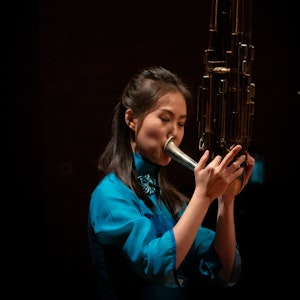Opening
Performed by Kenneth Lien (Jews' harp) and Astrid Garmo (Hardanger fiddle)
Silk String Quintet Happy Night
Composed by Hu Dengtiao, performed by Xue Nuoya, Chen Ziwen, Sun Qi, Wang Yuchen and Cao Junyuan.
The “silk string quintet” is a new genre of Chinese national chamber music, established by Mr. Hu Dengtiao of Shanghai conservatory of Music, consisting of five traditional Chinese string instruments, namely, Erhu, Yangqin, Liuqin, Pipa, and Zheng. The collaborative combination of the five distinctive instruments, with Western string music techniques adopted, is suitable for the expressiveness of elegant and graceful atmosphere, and also adds to the novelty and charm of the vivid and lively melody. Happy Night is one of the most representative works of Prof. HU’s many creations for silk string quintet. In this piece, the composer vividly depicts various wonderful scenes at the evening party with novel creative techniques.
Yangqin Solo Spring
Composed by Wang Se, performed by Cao Junyuan.
The spring sings a beautiful song like a stream flowing; the spring presents a graceful dance, enchantingly charming. The joy of spring makes me completely relaxed and happy; the sound of spring wakes me up from dream and fantasy. Spring breeze, spring rain, spring thoughts, spring dreams, all come together and interweave into a soothing pastoral scene in spring. Cherish and enjoy the lovely spring day today, and usher in an even better tomorrow with the hope that’ll never decay.
Flute Solo Spring Coming to the Secluded Orchid
Composed by Zhao Songting, performed by Zhang Han, Yangqin Accompaniment by Cao Junyuan.
Premier Zhou En’lai of China once said, “The Kunqu Opera is an orchid.” Thus the composer created the Spring Coming to the Secluded Orchid by imitating the tone from the Kungqu Opera to commemorate the respected Premier Zhou. With an impressionistic approach, this piece aims at praising the elegance and fragrance of orchid and conveying the composer’s longing for a new and better life through the elegant and lyrical melody.
Liuqin Solo Spring Comes to the Yihe River
Composed by Wang Huiran, performed by Sun Qi.
Through the melody characteristic of Shandong folk songs, the music depicts the fresh and bright landscape of the vibrant spring on the banks of the Yihe River, eulogizing the happy and beautiful life of our people.
Zheng Solo A Song For Lotus
Composed by Li Lei, performed by Wang Yuchen.
The music presents before us the beautiful, intoxicating scenery of lotus flowers dancing in the pool, light shining upon the green leaves and dewdrops hanging on the petals, with the multiple reflections of the lotus through the complexly interwoven texture of twisting, smooth and delicate lines.
Sheng Solo Jin Tune
Composed by Yan Haideng, performed by Tian Xin.
This masterpiece features the singing tones of the North Road and Middle Road of Shanxi Bangzi (a kind of local opera), and vividly shows the unique local flavour of Shanxi folk music.
Pipa Solo Dance of the Mountain
Composed by Chen Yin, performed by Xue Nuoya.
Inspired by the simple and passionate people, local customs of singing and dancing, and the beautiful scenery in southwestern China, the composer created this music with elements from the folk music of the Miao and Buyi minorities in Guizhou Province. It features distinctive folk flavour and a novel style and retains a hint of modern music while maintaining the local music characteristics.
Erhu Solo Song of the Winding River
Performed by Chen Ziwen. Yangqin Accompaniment by Cao Junyuan.
The Song of the Winding River is divided into four parts, that is, the prelude, the adagio, the allegro and the end. It is a piece of narrative music in ternary form and characteristic of Shaanxi music style adapted from the folk operas of Shaanxi Province. The sharp emotional contrast between the passionate vehemence and beautiful pathos gives it a kind of unique impressiveness. It is also one of the typical Qin school erhu works.
Suona Solo Love for the Guanzhong Region
Composed by Liang Xin, conducted by Chen Xiaodong, performed by Liang Shuai and accompanied by the National Chamber Orchestra of Shanghai Conservatory of Music.
With music language based on the interwoven materials from the Shaanxi Qinqiang Opera and folk music of the Guanzhong Region, this music work vividly depicts the simple, imperturbable, as well as straightforward and optimistic character of the folks in Guanzhong Region. Besides, their faint pessimism over the miserable past and their love and praise for the happy life they now enjoy is also conveyed in the music.
National Chamber Music Jumping Melody
Composed by Su Xiao, conducted by Chen Xiaodong and performed by Tian Xin, Xue Nuoya, Chen Ziwen, Sun Qi, Wang Yuchen, Cao Junyuan, Zhang Han and Liang Shuai.
The melody is the soul of music. The composer turned traditional folk music into a twisty and varied melody line to reveal the rich emotions of the human soul — at a time it is smooth and melodious like a cordial conversation, at other time low and deep like a sad sigh, and passionate as a happy song, or soft as a croon. The music not only inherits but also evolves and innovates the folk art by integrating traditional musical language with modern composition techniques and harmonic colour, thus bring the audience endless imagination and sentiment through its capricious melody.
